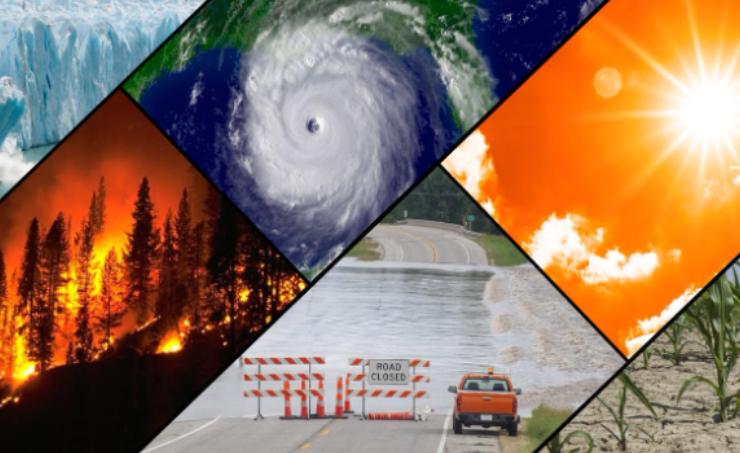Climate change is one of the most pressing global challenges of our time, with far-reaching consequences for both the natural environment and human societies. Among the many effects of climate change, one critical aspect is the displacement of people from their homes and communities due to the adverse effects of environmental changes. This displacement leads to significant threats to fundamental human rights, exacerbating existing inequalities and vulnerabilities. This article explores the impact of climate change on population displacement and the subsequent challenges faced in ensuring access to fundamental human rights, drawing on real-world examples from different regions.
Displacement and Climate Change
The effects of climate change, such as rising sea levels, extreme weather events, droughts and desertification, pose a significant threat to communities worldwide. As a result, millions of people get forced to flee their homes each year, seeking refuge in other regions or countries. This climate-induced displacement takes various forms, including internal migration, cross-border movement and even permanent resettlement.
The Pacific Islands are a prime example of how climate change disproportionately affects vulnerable communities. Rising sea levels and intensified storms threaten the very existence of low-lying atoll nations like Kiribati and Tuvalu (Observer Research Foundation, 2023). As their lands become uninhabitable, many residents are already seeking refuge in neighbouring countries like New Zealand and Australia. However, the lack of a legal framework for climate refugees makes it challenging for these communities to gain official recognition and access essential services in their new host countries.
Access to Basic Human Rights
Climate-induced displacement creates a series of challenges that severely impact the ability of affected communities to access fundamental human rights. The loss of homes, livelihoods and communities disrupts their socio-economic fabric and often leaves them marginalised and deprived.
(a) Right to Adequate Housing
The right to adequate housing is fundamental for human dignity and well-being. However, climate-induced displacement often forces people into makeshift shelters or crowded informal settlements, where access to sanitation, clean water and other basic amenities is limited.
Bangladesh is highly vulnerable to the impacts of climate change, with its coastal regions experiencing frequent cyclones and flooding. As a result, many people get displaced, leaving them in impoverished conditions with inadequate access to housing. Overcrowded slums, such as those in the capital city of Dhaka, highlight the struggle for the right to adequate housing in a climate-displaced population (The Climate Reality Project, 2021).
(b) Right to Food and Water
Climate change disrupts agricultural patterns, affecting food production and water availability. Displaced communities often struggle to maintain their livelihoods and access sufficient nutrition and clean water, leading to food insecurity and malnutrition.
Sub-Saharan Africa is vulnerable to prolonged droughts, causing crop failure and water scarcity. In regions like the Sahel, climate-induced displacement exacerbates existing food insecurity (United Nations, 2022), leaving communities dependent on humanitarian aid and facing severe malnutrition.
(c) Right to Health
Displacement and changing climatic conditions can also impact public health, with increased risks of infectious diseases and mental health issues in affected populations.
People displaced due to climate change, for instance Pacific Islanders, often face challenges in accessing healthcare services. They experience mental health problems due to the trauma of losing their homes and communities (NZ Herald, 2017). They may also encounter cultural barriers and discrimination while seeking medical assistance in their new host countries.
Climate-Induced Displacement and International Law
The challenges of climate-induced displacement have highlighted the need for a comprehensive legal framework to protect the rights of those affected.
The Nansen Initiative, launched in 2012, aimed to address the protection gaps faced by people displaced across borders due to natural disasters, including climate change. Though not legally binding, it laid the foundation for the creation of the Global Compact on Refugees, which recognised the impact of climate change on displacement and called for greater international cooperation.
Conclusion
Climate change’s impact on the displacement of people poses significant threats to fundamental human rights, including access to housing, food, water and health. Vulnerable communities around the globe bear the brunt of these challenges, highlighting the urgent need for international collaboration and comprehensive legal frameworks to protect the rights of climate-displaced individuals. Addressing climate change and ensuring the protection of human rights must be interconnected goals to create a sustainable and just future for all.
Bibliography
1. Image Source- National Oceanic and Atmospheric Administration, 2021. [Online]
Available at: https://www.noaa.gov/education/resource-collections/climate/climate-change-impacts
[Accessed 20 July 2023].
2. NZ Herald, 2017. Home. [Online]
Available at: https://www.nzherald.co.nz/kahu/climate-change-five-ways-it-could-harm-us/UVBFLUNMBE2A5XHGP7ZVH4AZKQ/
[Accessed 21 July 2023].
3. Observer Research Foundation, 2023. [Online]
Available at: https://www.orfonline.org/expert-speak/one-region-two-narratives/
[Accessed 20 July 2023].
4. The Climate Reality Project, 2021. [Online]
Available at: https://www.climaterealityproject.org/blog/how-climate-crisis-impacting-bangladesh
[Accessed 20 July 2023].
5. United Nations, 2022. Climate and Environment. [Online]
Available at: https://news.un.org/en/story/2022/11/1130712
[Accessed 20 July 2023].

